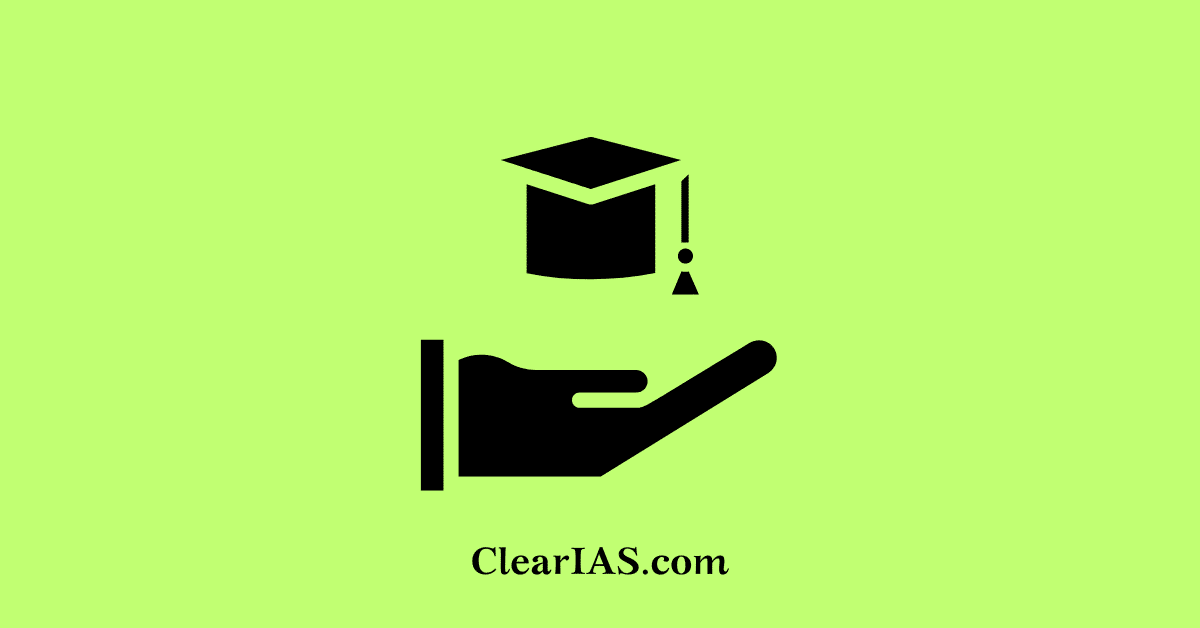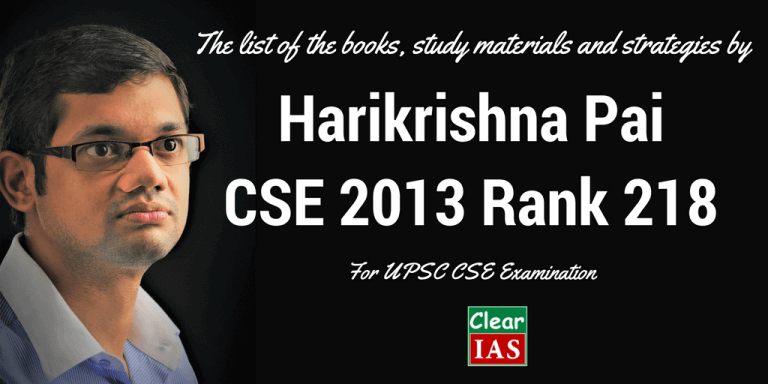 Harikrishna Pai IPS (CSE 2013 Rank 218) shares the list of the books and study materials he referred for UPSC Civil Services Prelims and Mains in this part of his interview with Clear IAS. If you missed Part 1 and Part 2 of the Harikrishna Pai’s, topper’s interview with ClearIAS, follow the corresponding hyperlinks given at the bottom. Now straight into the preparation strategies of Harikrishna Pai and books recommended by him for UPSC Prelims and Mains.
Harikrishna Pai IPS (CSE 2013 Rank 218) shares the list of the books and study materials he referred for UPSC Civil Services Prelims and Mains in this part of his interview with Clear IAS. If you missed Part 1 and Part 2 of the Harikrishna Pai’s, topper’s interview with ClearIAS, follow the corresponding hyperlinks given at the bottom. Now straight into the preparation strategies of Harikrishna Pai and books recommended by him for UPSC Prelims and Mains.
The preparation strategies and study materials used by Harikrishna Pai for UPSC Prelims

ClearIAS.com: Can you elaborate on your preparation strategies/approach and study materials and books used for Prelims Paper 1 and Paper 2 (Please mention books/materials used for each subject)?
- Ancient India – NCERT Class XI (R.S.Sharma)
- Medieval India – NCERT Class XI (Sathish Chandra)– focus on culture part
- Modern India- NCERT Class XII (Bipan Chandra), India’s struggle for independence
- Geography: NCERT XI (Fundamentals of Physical Geography, India: Physical Environment, NCERT XII (India: People & Economy)
- Polity: Indian Polity: Laxmikant
- Economics: Introductory Macroeconomics (NCERT Class XII), Economic Survey + Institute notes from Pala
- Science and Technology: Didn’t make any special preparation- 10th standard level S & T knowledge would suffice + topics related to current developments (Eg: stem cells- widely discussed in last year’s newspapers )
- Environment: NCERT XII Biology (2006) relevant portions, MoEF website, India Yearbook– relevant portions, Institute notes
- Current Affairs: Newspaper (The Hindu) + Manorama Yearbook /Mathrubhumi Yearbook.
- General Studies Paper 2 (CSAT): No Special preparation. Practised sample questions from the institute.
ClearIAS.com: Any tips/advice for UPSC Civil Services Prelims?
Focus on concepts rather than by-hearting facts. Practice sample questions.
The preparation strategies and study materials used by Harikrishna Pai for UPSC Mains
ClearIAS.com: Can you elaborate on your preparation strategies/approach and study materials and books used for each topic of Mains Papers? (Please give a detailed view, especially for sub-topics in all the general studies papers. Also please mention the books/materials used for each subtopic like Disaster Management, Internal security, Indian Society, Biodiversity etc.)
- Regional Language (Compulsory): (Malayalam): no much effort put. Used to reading and writing earlier also. Old question papers serve as a useful reference.
- English Language (Compulsory): No special preparation.
- Essay Paper: [Also mention the essay you wrote] Gave special emphasis to certain most likely areas for the essay (Eg: women’s issues) while preparing for GS itself. No special study other than collecting ideas from available sources. (The Hindu’s Sunday Story (now redundant) is an example, Yojana, Kurukshetra, frontline etc for collecting points ). Practised writing sample essays.
Organising thought and presenting various dimensions of the topic are important for an essay. So essay can’t be studied. It is a reflection of our ideas. I wrote on “Gross Domestic Happiness is as important as Gross Domestic Product” – gave a general idea of development perspectives, India’s growth path, major challenges in our progress, what to do etc.
- General Studies 1: History was my option. So left those portions as such. For GS following books shall be useful-
Modern India: same as prelims
Post Independence: India Since Independence (Bipan Chandra): but this book seems a bit biased. + Items discussed in News
World History: NCERT Class X India and the Contemporary World 2, India and the Contemporary world 1 (The Story of civilisation Volume C- from Industrial Revolution), NCERT XII (Modern world History: Arjun Dev)
Culture: Relevant portions from Ancient & Medieval NCERT + Spectrum’s Facets of Indian Culture Paperback (selected reading) + website of Centre for Cultural Research and Training (selected points only) + current issues
Sociology – NCERT Introducing Sociology Textbook for Class XI, Class XII NCERT Social Change and Development in India, Class XII NCERT (Indian Society Textbook in Sociology) + Current issues+ Institute notes for select topics
Geography : Prelims books + Relevant portions from Human & Economic Geography (Leong & Morgan) – old book,so data obsolete) + current issues
- General Studies 2: Mostly current related topics asked last time. So Newspaper reading is vital. Relevant topics shall be referred in Introduction to the Constitution of India, D.D.Basu and Indian Polity by Laxmikant. Second ARC fourth report (Ethics in governance) is also good.
Bilateral: current issues, IDSA comments. PRS review on bills/policies. Yojana/Kurukshetra for Panchayath, rural development etc.
- General Studies 3: Economy: current issues + Institute notes from Pala, XIIth Five year plan report (selective reading).
Environment- Current issues, relevant government reports of the time, MoEF site + Yearbook.
Disaster Management: Concepts from NCERT & CBSE book on DM, ARC report summary, current issues.
Science & Tech : Newspaper + Wikipedia search, gktoday etc.
Security: IDSA, Newspaper etc.
- General Studies 4 (Ethics): Studied concepts from some notes. Had a general idea about thinkers. No other special preparation.
- Optional Paper 1: Ancient India: Upinder Singh (History of Ancient and Early Medieval India), Spectrum Maps (Historical Atlas of India (Optional)) or (Historical Atlas Of India)+ Sites in other textbooks, NCERT, Manikant Singh Sir’s notes. Medieval India: Sathish Chandra (Part I & Part II), Manikant Singh Sir’s notes
- Optional Paper 2: Modern India: all mentioned ones (Prelims) + A New Look at Modern Indian History: From 1707 To The Modern Times by B.L. Grover, Alka Mehta + Modern India: 1885-1947 by Sumit Sarkar. World History: All mentioned GS books + Aspects of European History (Stephen J Lee)+ Institute notes (Baliyan Sir, Shobhan sir)
ClearIAS.com: What was your optional subject? Please give some insights on your selection of optional subject also.
I chose History. Optional require study in a reasonable depth. So “How far I can do well (both studies & Writing) on this subject?” shall be the single most important question while choosing optional. How far our study method matches with the subject etc needs to be analysed with the help of syllabus and previous question papers. Availability of guidance & books, previous knowledge in the subject etc can also be considered. I don’t believe in scoring/not scoring (subjects) theory which is mainly a creation of coaching institutes. I mostly relied on self-study and got reasonably good marks. Of course, guidance from seniors was valuable in this regard.
ClearIAS.com: What was the colour of the pen you used for writing mains (Blue Ink/ Black Ink)? Also, the company and brand name of the pen used:
Black, Reynolds Trimax.
ClearIAS.com: What was your writing style in GS and optional? Bullet Points/ Essay style or a mix of both styles?
For GS: mix of both;
For Optional: Essay type.
ClearIAS.com: What are the government reports that aspirants should go through, before giving Mains Exam?
Selective reading of second ARC reports seems useful, but I won’t say it’s indispensable. Important outcomes of committees etc can be important, but newspapers can be effectively used for this.
ClearIAS.com: Did you use sub-heading/points/graphs in your essay paper?
I used subheadings, but no graphs/bullets.
ClearIAS.com: If you didn’t explain it in detail earlier (Qn 1), can you brief on how you attempted the Ethics paper? Strategies and writing style for Ethics case studies?
I used a mix of both bullet points & paragraphs while writing answers. For case studies, I tried to bring out various issues involved, alternatives, suggestions etc. To be frank, I answered in the way by which I could have dealt the cases in real life (use with caution. It’s MY method)
ClearIAS.com: What was your exam-hall strategy for mains: attempting all questions even at the cost of compromising quality or writing only quality answers compromising on the number of questions attempted?
My strategy was a tradeoff between these two. Tried to attempt maximum questions at the reasonably good quality. But I faced time crunch in paper II.
- Click to read Harikrishna Pai (CSE 2013 Rank 218) UPSC Topper’s Interview – Part 1.
- Click to read Harikrishna Pai (CSE 2013 Rank 218) UPSC Topper’s Interview – Part 2.
- Click to read Harikrishna Pai (CSE 2013 Rank 218) UPSC Topper’s Interview – Part 4.
- Click to read Harikrishna Pai (CSE 2013 Rank 218) UPSC Topper’s Interview – Part 5.






How can those students prepare who dont study history after 10 th class